Sudan’s Military Overthrows President Amid Bloody Protests
Omar al-Bashir's repressive 30-year rule ends as pro-democracy protest organizers denounce the army's takeover.CAIRO — Sudan’s military overthrew President Omar al-Bashir on Thursday amid increasingly bloody protests over his repressive 30-year rule and the deteriorating economy. But pro-democracy demonstrators were left angry and disappointed when the defense minister announced the armed forces will govern for the next two years.
Al-Bashir’s fall came just over a week after protests in Algeria forced the resignation of that North African country’s long-ruling, military-backed president, Abdelaziz Bouteflika.
Together, the developments represent a second generation of street protests eight years after the Arab Spring uprisings that ousted a number of long-entrenched leaders around the Middle East.
But like those popular movements of 2011, the new ones face a similar dynamic — a struggle over the aftermath of an autocrat’s removal.
Protest organizers in Sudan quickly denounced the army’s takeover and vowed to continue rallies until a civilian transitional government is formed, raising the possibility of a clash with the military. Tens of thousands of demonstrators were massed at a sit-in they have held for nearly a week outside the military’s headquarters in central Khartoum, the capital.
After the televised announcement of al-Bashir’s arrest by Defense Minister Awad Mohammed Ibn Ouf — who is himself under U.S. sanctions for links to atrocities in Sudan’s Darfur conflict — many protesters chanted angrily, “The first one fell, the second will, too.” Some shouted, “They removed a thief and brought in a thief!”
Ibn Ouf said a military council that will be formed by the army, intelligence agencies and security apparatus will rule for two years, after which “free and fair elections” will take place.
He also announced that the military had suspended the constitution, dissolved the government, declared a state of emergency for three months, closed the country’s borders and airspace and imposed a curfew for one month.
Al-Bashir, whose whereabouts were not immediately known, came to power in a coup of his own in 1989, backed by the military and Islamist hard-liners. He kept an iron grip on power and brutally suppressed any opposition, while monopolizing the economy through allied businessmen.
Over his three decades in control, he was forced to allow the secession of South Sudan after years of war, a huge blow to the north’s economy. He became notorious for a deadly crackdown on insurgents in the Darfur region that made him an international pariah, wanted on genocide charges. The U.S. targeted his government repeatedly with sanctions and airstrikes for his support of Islamic militant groups.
Throughout, he was a swaggering figure known to dance with his cane in front of cheering crowds.
The street protests that erupted in December were met with crackdowns by the government that left dozens of people dead and eventually turned the military leadership against al-Bashir. Several times in the past week, Army troops trying to protect the rallies exchanged fire with security forces.
The protests were initially fueled by anger over the deteriorating economy but quickly turned to demands for the president’s ouster, and gained momentum last week after Bouteflika’s resignation in Algeria.
Word of al-Bashir’s removal emerged in the morning, when state TV announced that the military was about to make an “important statement,” and two high-ranking officials told The Associated Press that al-Bashir had been ousted. That prompted thousands of protesters to march toward the center of Khartoum, cheering, singing and dancing in celebration.
The announcement finally came hours later, from ibn Ouf, a key power figure in al-Bashir’s regime.
“I, the defense minister, the head of the Supreme Security Committee, announce the uprooting of this regime and the seizing of its head, after detaining him in a safe place,” he said.
He denounced al-Bashir’s government for “bad administration, systemic corruption, absence of justice,” adding: The poor became poorer and the rich became richer. Hope in equality has been lost.” He also said al-Bashir’s crackdown against protesters risked splitting the security establishment and “could cause grave casualties.”
Mariam al-Mahdi, a leading member of the opposition Umma, called the military’s takeover “a dangerous move.”
“Our demands are clear: We don’t want to replace a coup with a coup,” al-Mahdi said.
The protest movement has been a mix of young activists, students, professional unions and traditional opposition parties.
Security forces came down hard from the start, using tear gas, rubber bullets, live ammunition and batons. Al-Bashir banned unauthorized public gatherings and granted sweeping powers to the police after imposing a state of emergency last month.
After Bouteflika’s fall, the Khartoum protesters launched the sit-in, and the crackdown grew bloodier, with at least 22 people killed since Saturday.
Your support matters…Independent journalism is under threat and overshadowed by heavily funded mainstream media.
You can help level the playing field. Become a member.
Your tax-deductible contribution keeps us digging beneath the headlines to give you thought-provoking, investigative reporting and analysis that unearths what's really happening- without compromise.
Give today to support our courageous, independent journalists.
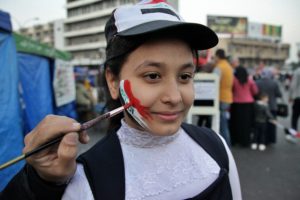
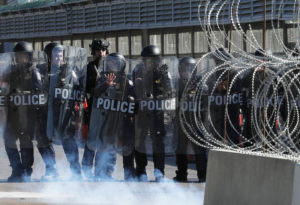
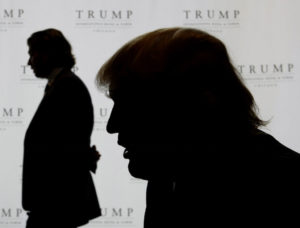
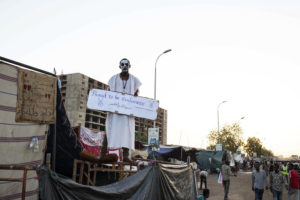
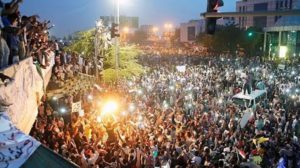
You need to be a supporter to comment.
There are currently no responses to this article.
Be the first to respond.